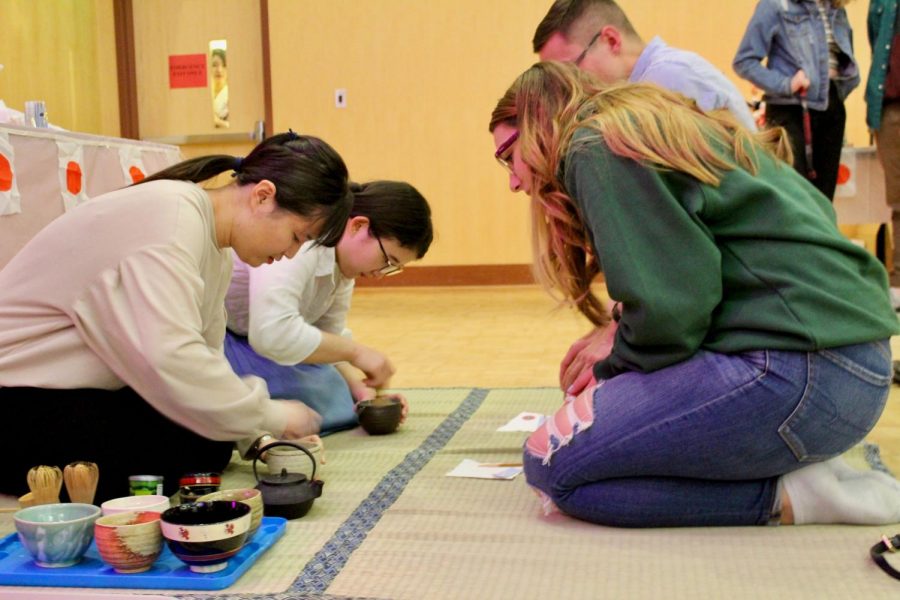Haru Matsuri celebrates Japanese culture
At Sakura Matsuri, Japanese students showed students attending some traditional cooking as well as how it was traditionally made
April 24, 2019
The smell of takoyaki (a savory octopus snack), the loud rumbling of taiko drums and students wearing kimono and yukata were only a small slice of Japanese culture that was on display on Monday, April 22.
The annual Haru Matsuri— literally “Spring Festival” in Japanese— was held in the SURC Ballroom to celebrate Japanese culture.
Although it took place in the ballroom because of last year’s windy weather, this year’s theme was “night market.”
There were 10 food booths and activity booths, such as origami and kanji-naming, stationed throughout the ballroom.
At each booth, Japanese students from the Asian University America Program (AUAP) served food or gave instructions to the guests.
Performances such as taiko drumming, a fashion show and the Japanese “Fisherman’s Dance,” performed by AUAP students and students from Mount Stuart Elementary School, were another attraction at the festival.
Mounia Traore is a student program coordinator at the Diversity and Equity Center (DEC) and was the lead programmer for this year’s Haru Matsuri.
“[The event] allows AUAP students to celebrate even though they are not home, that they have a sense of home here,” Traore said. “It’s important for them to be included into the process and actually lead the booths because they know it better than we do.”
Traore said the festival also offered a learning opportunity for domestic students.
“[CWU] has a lot of diversity when you take into account all the different cultures that we have on campus, so it’s important for every student to try to learn more about this culture,” Traore said.
Mark Werdin is a student services coordinator of the AUAP program and has helped out with the event over the years.
Werdin said that Haru Matsuri provides the AUAP students a good chance to interact with domestic students.
“A lot of the times, AUAP students are here as a student, to learn about the American culture,” Werdin said. “But here, they’re the teachers, and showing off their culture.”
Aoi Magara is an intern at the Office of International Studies and Programs (OISP) and has helped coordinate the AUAP and University English as a Second Language (UESL) student volunteers.
Magara said Japanese students often find it difficult to talk to American students.
“Usually Japanese people are so polite, so [they might think] ‘if I speak wrong English, is it impolite?’” Magara said.
“I want [CWU students] to understand that we want to be friends with them and be involved with them so it’s nice to have this opportunity,” Magara added.
Yoko Hino, an AUAP student, helped at the onigiri food booth. Onigiri is a Japanese food made up of rice and nori, or roasted seaweed.
In order to make one, Hino said you first “hold rice, make a triangle with seaweed on the outside.” Ingredients such as tuna, plum and salmon will fill the inside.
“My English is not good, and maybe I can’t [explain well], but I think to try is important,” Hino said.
Wakako Ban, a UESL student, said she participated in the fashion show.
“I [wore] Japanese traditional wear, like kimono or uniform,” Ban said. “After arriving here, I miss Japan so I’m excited that I will watch [Japanese performances] and eat Japanese food.”
Ban said that she hesitated before signing up, but wanted people to learn more about Japanese culture.
“I don’t like to stand in front of an audience but I want to meet American people so I decided to join,” Ban said.
Werdin said CWU students and community members can continue to engage in Japanese culture by attending future events. The upcoming World Languages Day, which is on May 17, the quarterly International Cafe and the AUAP Japanese Summer Festival in July are some examples.
Traore said that after Haru Matsuri, people can take further steps to learn more about Japanese culture, but they should get to know more than one part of the culture.
“Since it’s a learning process, I will say for some people, it will probably be a shock because there’s always a [culture shock],” Traore said. “But they should be ready, be willing to actually learn the culture, the whole culture, everything included in it.”



Asian Snack Guy • Apr 25, 2019 at 1:15 pm
I love the idea of smelling takoyaki octopus balls from the moment of walking into the spring festival!